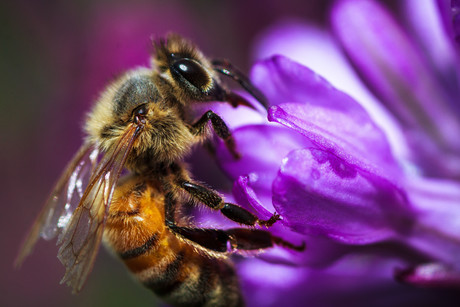Honeybees get stressed too

Macquarie University researchers have revealed the direct relationship between the impact of stress and a foraging honeybee’s ability to learn, in a breakthrough study that shows stress is far from a solely human trait.
Every day, forager bees make many trips in the environment, travelling long distances to gather the dispersed, hidden and vital resources of pollen and nectar from flowers. On every trip, they face threats of predation, challenging weather conditions and the very real risk of getting lost — challenges that are said to lead to significant stress.
Seeking to show how chronic stress affects bees’ problem-solving abilities, the Macquarie research team attached individual radio tags to individual foraging bees, to track the behaviour of each. The results of the study, published in the journal PLOS ONE, revealed that bees that had been foraging for a long time or at high intensities were less able to learn new information.
“Young bees were the most affected by the rigours of foraging,” said Dr Andrew Barron, an associate professor at Macquarie University and lead researcher on the study. “They showed the greatest foraging-induced decline in problem-solving abilities. I was baffled when we found out that foraging had such a negative impact on bees because I was seeing foraging as mental training in a rich and complex environment.
“Honeybees need to be working at their mental best to navigate between the flowers and the hive in order to collect a sufficient amount of food for the colony. Yet our study tells that intensive working hours in the foraging environment are detrimental to bees, in particular young bees that seemed to be less resilient to environmental stressors.”
In addition to discovering the similarities we share with honeybees when it comes to stress and the knock-on effects it has on our cognitive ability, the research has direct real-world relevance. With honeybee populations on the decline, it reveals the urgency with which we need to identify the environmental factors facilitating decline in foragers’ mental abilities.
Colon cancer DNA in blood can guide chemo decisions
A simple blood test could change how doctors decide which patients with colon cancer need...
Non-invasive blood test helps rule out oesophageal cancer
Designed and developed in Australia, the PromarkerEso test is designed to offer a quick,...
Taste-based flu test enables rapid diagnosis
The diagnostic tool consists of the sensor molecule thymol and a virus-specific sugar building...



